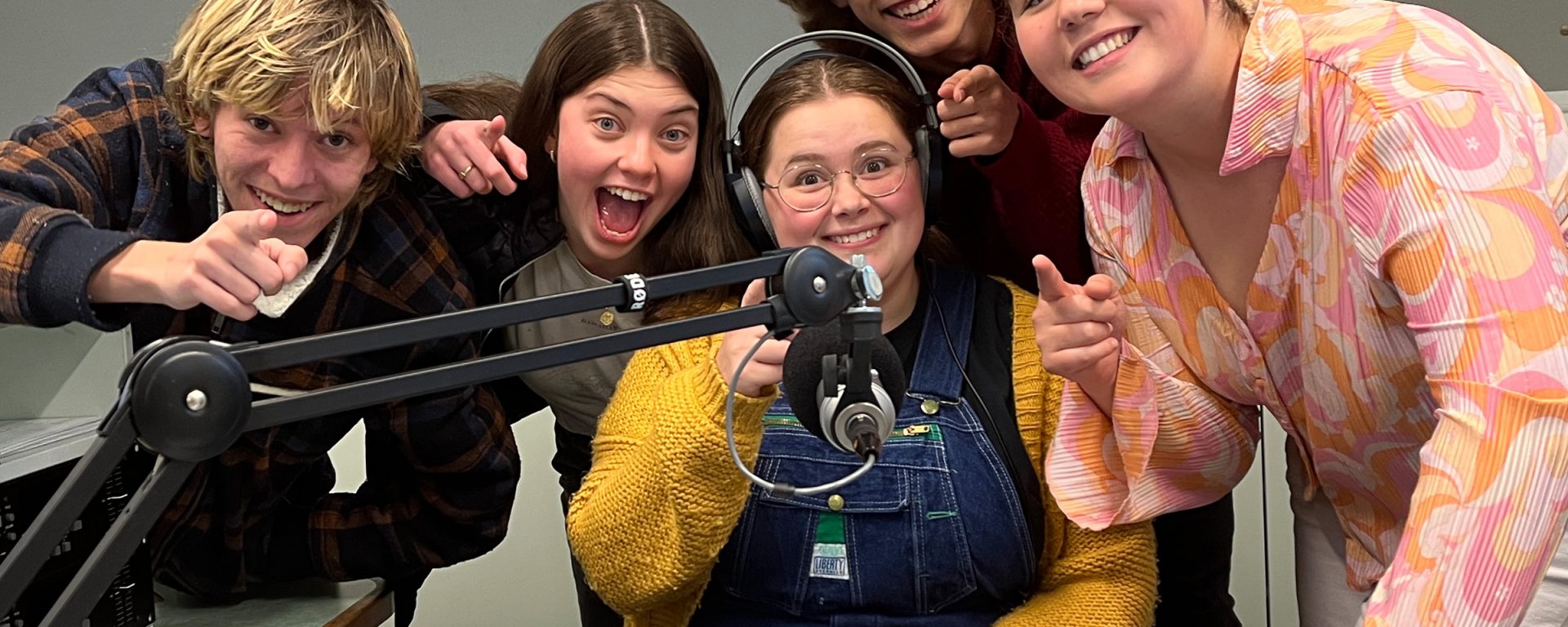Are you thinking about doing a Bachelor of Communication1 but not quite sure where it could take you? Wondering: what can I do with a communication degree? We’re here to help! The world of communication offers lots of exciting and rewarding career opportunities. If you’ve got strong communication abilities, creativity and strategic thinking skills, you can choose a career that fires up your imagination. Think crafting epic narratives that captivate audiences, masterminding marketing campaigns that go viral, or becoming the voice of a brand that makes a difference. So, let’s dive into some of the Bachelor of Communication jobs you could make your mark in.
1. Public relations specialist

As a public relations specialist, you’ll be the champion of your organisation or clients. You’ll craft compelling narratives and manage media relations. And you’ll navigate the intricate landscape of public perception and reputation management like a total pro.
But it’s not just about storytelling. You’ll also wield the power of strategic communication to influence opinions. Shape narratives. And build lasting relationships with diverse stakeholders. Your work will also extend to crisis management. You’ll be quick on the draw to respond to any challenge or reputational risks in the rapidly-evolving media landscape.
Traditional media channels are where you’ll start, but you’ll also harness the huge potential of digital platforms and social media to engage with audiences in real-time, driving conversations and fostering community trust. By analysing trends, monitoring public sentiment and leveraging data-driven insights, you’ll sharpen your strategies and amplify your messages.
2. Marketing manager

Marketing managers are integral to the success of a business. They spearhead the development and implementation of strategic marketing campaigns aimed at promoting products or services. You’ll combine market research, consumer behaviour analysis and innovative branding strategies in your work. Basically, you’ll be the ultimate hype person.
But that’s not all. Far from it. In addition to creating compelling advertising materials and engaging digital content, you’ll also see what’s hot by analysing market trends, and see if the cool stuff is working by evaluating the effectiveness of various marketing initiatives. Moreover, you’ll team up with people from across the organisation, including sales, product development, and creative departments, to make things happen – and meet business objectives.
Plus, you’ll get to use a range of digital tools and platforms, such as social media, email marketing, and search engine optimisation (SEO), to enhance your brand’s visibility and drive customer engagement. And it’s here that innovation can really take off, as Charles Sturt marketing graduate Tara Salmon found:

“I love marketing in the tech space. It’s creative and innovative and data driven. And you can see the impact your work is having on the growth of the organisation. Marketing is now recognised as a key part of the revenue engine.”
3. Corporate communication specialist

In essence, the role of a corporate communications specialist is being a company’s storyteller. It involves crafting compelling narratives, press releases and other communication materials that effectively convey the company’s mission, values and achievements. They shape the public image and messaging of a company. They’re the architects behind the communication strategies that resonate with various stakeholders – including employees, customers, investors and the general public.
Moreover, you’ll also be the key link between the company and the media, cultivating relationships with journalists and reporters to secure coverage and smoothing things over if there are any potential crises or controversies.
You could also coordinate internal communications. These ensure that employees are kept in the know about company developments, policies and events – and make everyone feel part of one big team.
4. Social media manager

When it comes to Bachelor of Communication jobs that hone in on technology, social media manager is right up there. As a social media manager, you’ll master all the social platforms to captivate your audience. Make sure everybody’s talking about you. And nurture thriving digital communities. You’ll orchestrate strategic campaigns for diverse demographics, use compelling content to make people curious, and design interactive features to get people engaged.
You’ll be a curator of experiences, weaving narratives that spark conversations, incite curiosity and inspire action across a spectrum of social channels. Your responsibilities could encompass not only the creation and curation of content, but also the meticulous analysis of performance metrics, deciphering audience behaviour, and refining strategies to optimise results. By staying across all the emerging platforms and trends, you’ll come up cool new ways of doing things that break through the digital noise and leave a lasting impression on your audience.
Travis Holland, senior lecturer in communication at Charles Sturt University, sees the internet as key for maximising the impact of your ideas.

“Technology also opens up lots of opportunities for sharing creativity. Audiences may be niche on the internet, but those niches can be very large. Moreover, interests can be serviced from around the world. Being able to find access to those groups is a very important skill – and offers great visibility for creative ideas.”
5. Journalist

Firstly, journalists play a crucial role in investigating and reporting on events, issues, and stories that shape our world. Secondly, they serve as the eyes and ears of the public, uncovering truth and holding people in power to account. And thirdly, they provide information that empowers individuals to make informed decisions.
As a journalist you could work across various media platforms, including newspapers, magazines, television, radio, and online outlets. In today’s digital age, the internet and social media platforms have expanded the reach of journalism. That allows for real-time reporting and instant dissemination of information. So that means journalists are now expected to have a wide skill set. Jock Cheetham, journalist and lecturer at Charles Sturt University, explains:
I think future journalists need to be multi-skilled and multidisciplinary. So, for example, if you want to be a print journalist, you still need to be well across current affairs, be able to fact check, have writing skills, network for contacts, know about legal requirements in your craft, apply ethics to your work, and so on. But increasingly you can’t really just be a text writer. You probably need to be able to add some photographs to your stories if required (even if just on your smartphone). Plus, be able to shoot video, in a lot of cases edit video. You also need – whatever platform you’re on – to work with social media in a skilful way.”
The good news is, you get to master all these skills when you study our Bachelor of Communication.
6. Advertising account executive

In the fast-moving world of advertising, account executives play a pivotal role as the bridge between clients and creative teams, orchestrating the conception, execution and success of advertising campaigns. To succeed, you’ll have a powerful mix of big-picture thinking, people skills and a spark of creativity. It’s what makes brands stand out in today’s super competitive market.
As an account exec, you’ll dive deep into understanding what clients want, who they’re trying to reach, and what makes their brand special. Plus, you’ll decipher client feedback and translate it into actionable insights that inspire awesome campaign concepts.
Beyond client interactions, you’ll also collaborate with creative teams, fostering an environment where ideas flourish and boundaries are pushed. You’ll harness the collective talent of copywriters, designers and strategists. And, together, you’ll create mind-blowing concepts, from the first lightbulb moment to the final product.
More ideas for Bachelor of Communication jobs
Here’s Chris Orchard, Associate Dean and an interdisciplinary researcher at Charles Sturt.
Creative skills are in demand across every industry, not just the traditionally creative ones. This is a combination of needing creative thinkers to solve problems, and also creatives to help all organisations engage with their audience in a world where the internet is so embedded in everyday life. Organisations need people to unearth, tell and package stories for their audiences; but equally thinking creatively, you also have people who can provide insight across the whole business value chain. The collaborative capacity of the industries can add value to any workforce.”
So, here are a few extra Bachelor of Communication jobs to consider:
- Content creation/writing – use your strong writing and storytelling skills to engage and inform audiences across various platforms.
- Market research analyst – gather and analyse data to inform strategic decision-making.
- Event coordinator – use your organisational skills to design and deliver events, from corporate conferences and product launches to community events and fundraisers.
- Human resources specialist – combine communication, interpersonal skills and emotional intelligence (a key soft skill) to work across recruitment, employee relations, training or organisational development.
Your first step?
The first thing you need to do in order to open up the world of Bachelor of Communication jobs is… do a Bachelor of Communication! Our undergraduate communication course is co-designed, co-developed and co-delivered with alumni and industry partners. And you can also specialise in an area that fires your imagination – so whichever dynamic career path you choose, you’re ready to make your mark.
1Cricos: 0101020



You must be logged in to post a comment.